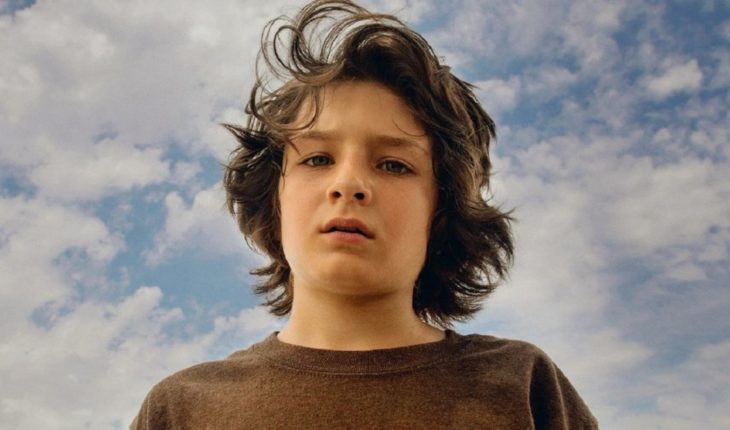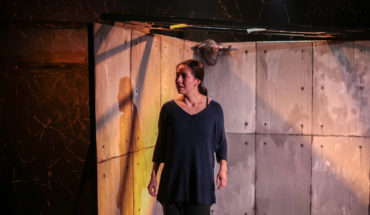Impossible to avoid comparisons between “In the 90s” (Mid90s, 2018) and “Lady Bird: Fly Home” (Lady Bird, 2017). Both film debuts – in the case of Greta Gerwig, alone – rescue the coming of age spirit from their stories, but always from a very personal point of view for their filmmakers, adding an authenticity and ‘naturalism’ that balances the perfection with a very careful narrative. While Gerwig’s award-winning debut feature puts us into the confusing early years of the new millennium, Jonah Hill first sits behind the scenes to show us his peculiar vision of “growing up in Los Angeles in the mid-1990s.” Hill is noted (and does not deny it) the influence of “Kids” (1995) by Larry Clark and Harmony Korine – even the screenwriter has a cameo in the film – but the actor turned into a filmmaker does not use the extreme pessimism, sordidness and low blows of this drama and set on the other North American coast. Instead, he walks us through little Stevie’s ‘here and now’ (Sunny Suljic), a 13-year-old boy who, like many at that age, is trying to find his place in the world, as he leaves childhood behind and hastily plunges into an adulthood with no apparent rules. Stevie has to deal with a rather abusive older brother (Lucas Hedges) and a young single mother (Katherine Waterston) who doesn’t know how to set a lot of boundaries. In the midst of this confusion, and lack of containment and friends, the young man sees in a group of motor Avenue skaters the camaraderie and belonging he needs. Gradually he reaches the group of companions and begins to wander with them through the streets of Palm, imitating his lifestyle, often excessive for his young age.
Impossible to avoid comparisons between “In the 90s” (Mid90s, 2018) and “Lady Bird: Fly Home” (Lady Bird, 2017). Both film debuts – in the case of Greta Gerwig, alone – rescue the coming of age spirit from their stories, but always from a very personal point of view for their filmmakers, adding an authenticity and ‘naturalism’ that balances the perfection with a very careful narrative. While Gerwig’s award-winning debut feature puts us into the confusing early years of the new millennium, Jonah Hill first sits behind the scenes to show us his peculiar vision of “growing up in Los Angeles in the mid-1990s.” Hill is noted (and does not deny it) the influence of “Kids” (1995) by Larry Clark and Harmony Korine – even the screenwriter has a cameo in the film – but the actor turned into a filmmaker does not use the extreme pessimism, sordidness and low blows of this drama and set on the other North American coast. Instead, he walks us through little Stevie’s ‘here and now’ (Sunny Suljic), a 13-year-old boy who, like many at that age, is trying to find his place in the world, as he leaves childhood behind and hastily plunges into an adulthood with no apparent rules. Stevie has to deal with a rather abusive older brother (Lucas Hedges) and a young single mother (Katherine Waterston) who doesn’t know how to set a lot of boundaries. In the midst of this confusion, and lack of containment and friends, the young man sees in a group of motor Avenue skaters the camaraderie and belonging he needs. Gradually he reaches the group of companions and begins to wander with them through the streets of Palm, imitating his lifestyle, often excessive for his young age. Stevie first meets Ruben (Gio Galicia), who soon introduces him to the rest of his group: Ray (Na-Kel Smith), who wants to become a professional skateboarder; ‘Fuckshit’ (Olan Prenatt), who despite his rebellion comes from a fairly well-off family; and ‘Fourth Grade’ (Ryder McLaughlin), who goes everywhere with his VHS camera, fantasizing about being a filmmaker. Stevie’s story is the story of all these teenagers, escaping a little from their own miseries (broken families, homes where they are abused or simply ignored) to find common elements with their peers. In this case, everything starts with skateboarding, a sport that somehow forces them to soak up the reality of the streets. “In the ’90s” is not a film that follows classic schemes. There are no heroes or villains here, not even a conflict in particular that alters the lives of the protagonists. Hill, also responsible for the script, tries to paint an atmosphere that he sure also experienced, like so many other Californian boys of the nineties. First sexual approaches, alcohol, drugs, some dismantence… nothing in the extreme or entirely dangerous, although we are shocked to see such a small kid taking these first steps that make him “grow suddenly”. It’s not really like that, but this cross with other congeners opens its eyes to the world around him, often veiled by his own middle-class white boy privilege. Hill plays with these contrasts and leans against his youth cast, many of them with no previous acting experience. Each of its protagonists has the opportunity to show off, letting out their personal dramas and longings, even in an age and a society that may not accompany them. Many may say that “In the 90s” nothing happens, but the filmmaker joins his characters in this ‘iniciatic journey’ that aims for maturity, thrilling with their small twists and confessions, without abusing references, obvious jokes, or low blows. Its aesthetic is that of MTV model ninety, a little dizzying, a little artisanal and raw, like the “documentary” that is pergerating the same ‘Fourth Grade’. Hill floods our ears with classics from Pixies, The Mamas and the Papas, Cypress Hill, Nirvana, and with the excellent soundtrack of the Oscar-winning Trent Reznor and Atticus Ross to put the bun on a debut that wins from their narrative and emotional sincerity, but above all because it feels very personal without the need to self-refer. Hedges continues to add great performances to his résumé, and Suljic doesn’t have to take his eyes off him. What’s more, this whole band of little girls breaks it, becoming the true soul of this story that doesn’t need to hold on to nostalgia, so fashionable for our days, to rip away laughter and tears, with a minimum budget and many good intentions and reflections about adolescence and its details. Impossible to avoid comparisons between “In the 90s” (Mid90s, 2018) and “Lady Bird: Fly Home” (Lady Bird, 2017). Both film debuts – in the case of Greta Gerwig, alone – rescue the coming of age spirit from their stories, but always from a very personal point of view for their filmmakers, adding an authenticity and ‘naturalism’ that balances the perfection with a very careful narrative. While Gerwig’s award-winning debut feature puts us into the confusing early years of the new millennium, Jonah Hill first sits behind the scenes to show us his peculiar vision of “growing up in Los Angeles in the mid-1990s.” Hill is noted (and does not deny it) the influence of “Kids” (1995) by Larry Clark and Harmony Korine – even the screenwriter has a cameo in the film – but the actor turned into a filmmaker does not use the extreme pessimism, sordidness and low blows of this drama and set on the other North American coast. Instead, he walks us through little Stevie’s ‘here and now’ (Sunny Suljic), a 13-year-old boy who, like many at that age, is trying to find his place in the world, as he leaves childhood behind and hastily plunges into an adulthood with no apparent rules. Stevie has to deal with a rather abusive older brother (Lucas Hedges) and a young single mother (Katherine Waterston) who doesn’t know how to set a lot of boundaries. In the midst of this confusion, and lack of containment and friends, the young man sees in a group of motor Avenue skaters the camaraderie and belonging he needs. Gradually he reaches the group of companions and begins to wander with them through the streets of Palm, imitating his lifestyle, often excessive for his young age. Stevie first meets Ruben (Gio Galicia), who soon introduces him to the rest of his group: Ray (Na-Kel Smith), who wants to become a professional skateboarder; ‘Fuckshit’ (Olan Prenatt), who despite his rebellion comes from a fairly well-off family; and ‘Fourth Grade’ (Ryder McLaughlin), who goes everywhere with his VHS camera, fantasizing about being a filmmaker. Stevie’s story is the story of all these teenagers, escaping a little from their own miseries (broken families, homes where they are abused or simply ignored) to find common elements with their peers. In this case, everything starts with skateboarding, a sport that somehow forces them to soak up the reality of the streets. “In the ’90s” is not a film that follows classic schemes. There are no heroes or villains here, not even a conflict in particular that alters the lives of the protagonists. Hill, also responsible for the script, tries to paint an atmosphere that he sure also experienced, like so many other Californian boys of the nineties. First sexual approaches, alcohol, drugs, some dismantence… nothing in the extreme or entirely dangerous, although we are shocked to see such a small kid taking these first steps that make him “grow suddenly”. It’s not really like that, but this cross with other congeners opens its eyes to the world around him, often veiled by his own middle-class white boy privilege. Hill plays with these contrasts and leans against his youth cast, many of them with no previous acting experience. Each of its protagonists has the opportunity to show off, letting out their personal dramas and longings, even in an age and a society that may not accompany them. Many will be able to say that “In the 90s” nothing happens, but the filmmaker joins his characters in this ‘start-to-do journey’ that aims for maturity, thrilling with his small twists and confessions, without abusing references, obvious jokes, or low blows. Its aesthetic is that of MTV model ninety, a little dizzying, a little artisanal and raw, like the “documentary” that is pergerating the same ‘Fourth Grade’. Hill floods our ears with classics from Pixies, The Mamas and the Papas, Cypress Hill, Nirvana, and with the excellent soundtrack of the Oscar-winning Trent Reznor and Atticus Ross to put the bun on a debut that wins from their narrative and emotional sincerity, but above all because it feels very personal without the need to self-refer. Hedges continues to add great performances to his résumé, and Suljic doesn’t have to take his eyes off him. What’s more, this whole band of little girls breaks it, becoming the true soul of this story that doesn’t need to hold on to nostalgia, so fashionable for our days, to rip away laughter and tears, with a minimum budget and many good intentions and reflections about adolescence and its details.
Stevie first meets Ruben (Gio Galicia), who soon introduces him to the rest of his group: Ray (Na-Kel Smith), who wants to become a professional skateboarder; ‘Fuckshit’ (Olan Prenatt), who despite his rebellion comes from a fairly well-off family; and ‘Fourth Grade’ (Ryder McLaughlin), who goes everywhere with his VHS camera, fantasizing about being a filmmaker. Stevie’s story is the story of all these teenagers, escaping a little from their own miseries (broken families, homes where they are abused or simply ignored) to find common elements with their peers. In this case, everything starts with skateboarding, a sport that somehow forces them to soak up the reality of the streets. “In the ’90s” is not a film that follows classic schemes. There are no heroes or villains here, not even a conflict in particular that alters the lives of the protagonists. Hill, also responsible for the script, tries to paint an atmosphere that he sure also experienced, like so many other Californian boys of the nineties. First sexual approaches, alcohol, drugs, some dismantence… nothing in the extreme or entirely dangerous, although we are shocked to see such a small kid taking these first steps that make him “grow suddenly”. It’s not really like that, but this cross with other congeners opens its eyes to the world around him, often veiled by his own middle-class white boy privilege. Hill plays with these contrasts and leans against his youth cast, many of them with no previous acting experience. Each of its protagonists has the opportunity to show off, letting out their personal dramas and longings, even in an age and a society that may not accompany them. Many may say that “In the 90s” nothing happens, but the filmmaker joins his characters in this ‘iniciatic journey’ that aims for maturity, thrilling with their small twists and confessions, without abusing references, obvious jokes, or low blows.
Friends are friends
Its aesthetic is that of MTV model ninety, a little dizzying, a little artisanal and raw, like the “documentary” that is pergerating the same ‘Fourth Grade’. Hill floods our ears with classics from Pixies, The Mamas and the Papas, Cypress Hill, Nirvana, and with the excellent soundtrack of the Oscar-winning Trent Reznor and Atticus Ross to put the bun on a debut that wins from their narrative and emotional sincerity, but above all because it feels very personal without the need to self-refer. Hedges continues to add great performances to his résumé, and Suljic doesn’t have to take his eyes off him. What’s more, this whole band of little girls breaks it, becoming the true soul of this story that doesn’t need to hold on to nostalgia, so fashionable for our days, to rip away laughter and tears, with a minimum budget and many good intentions and reflections about adolescence and its details.
In this note:





